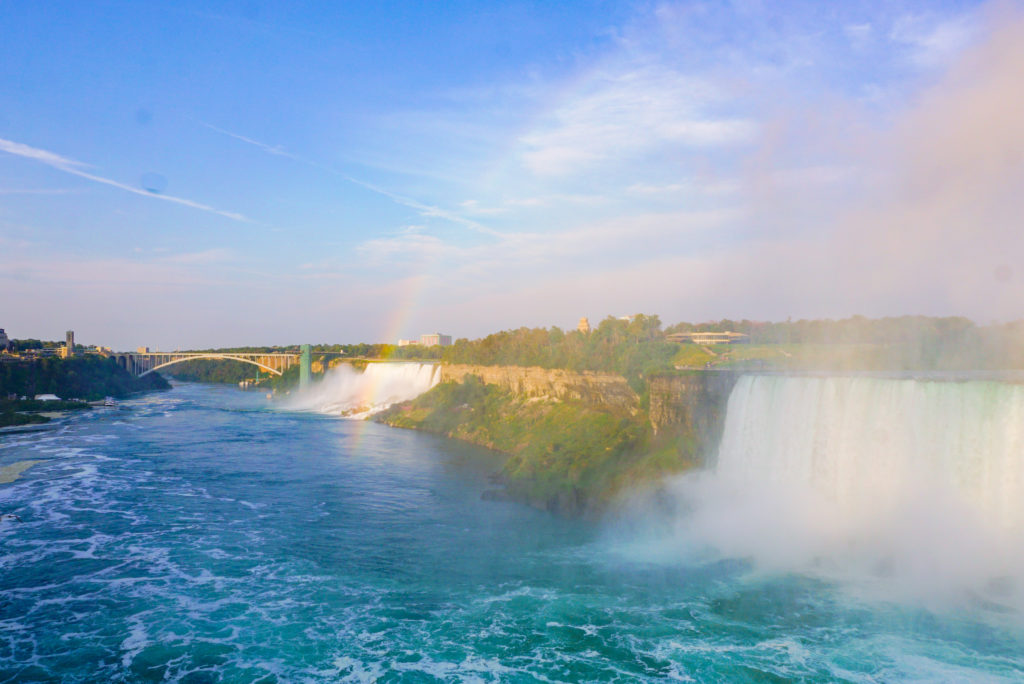Headed to Canada in an RV, eh? While it can be a little more complicated than crossing in your car, it’s pretty simple, as long as you’re prepared, so we hope these tips can help.
Last fall when we RVed to Niagara Falls, we were pretty unprepared. We ended up having to park on the U.S. side and drive across the border in our car every day to enjoy the area. So here’s what we wished we knew then.

What to know before crossing the border to Canada in your RV:
Just a quick visit to the Canada Border Services Agency website provided us with all the information we needed. In this post, we will break it down for you in a quicker, more simplified version. However, we recommend checking their website for any changes or updates.
3 things you MUST have:
- Every passenger in the RV will need proof of citizenship. Documents they accept are: a passport, birth certificate, a certificate of citizenship or naturalization, a U.S. Permanent Resident Card, or a Certificate of Indian Status along with photo identification.
- Proof of insurance and registration. You will be asked for these documents for all vehicles you are bringing into the country. You may also want to memorize or write down your license plate numbers!
- A story. Be prepared to state exactly where you are headed and how long you will be in Canada.
What you CAN bring:
- Your own “personal baggage”. This includes clothing, cameras, camping and sports equipment, personal computers and devices, and your mode of transportation.
- Pets. You will, however, be asked to present a current rabies certificate for all pets in the RV. All pet food and treats must be in their original, commercially packaged, unopened container and cannot weigh more than 44 pounds.
- Alcohol. You can bring approximately 24 cans or bottles of beer or ale, two 750 ml bottles of wine, and one large standard bottle of liquor.
- Tobacco: You can bring up to 200 cigarettes, 50 cigars, 7 ounces of manufactured tobacco, and 200 tobacco sticks.
- Money: If you have $10,000 or more in your possession when arriving in or departing from Canada, you must report to the CBSA.
- Prescription drugs: All medications just need to be in their original, labeled packaging.
What you CANNOT bring:
- Food, plants, animals and related products: Since these items can carry disease, all food, plants, animals, and related products must be declared. The Canada Border Services Agency website states that this includes eggs and dairy products. However, we’ve heard there is a bit of wiggle room with this. I just wouldn’t go grocery shopping and load up on food until after you’ve crossed the border to be safe!
- Explosives, fireworks and ammunition: You must have written authorization and permits to bring these items into Canada.
- Firearms and weapons: You must declare all weapons and firearms at the port of entry when you enter Canada.

We’ve heard from plenty of RVers that crossing the Canadian border is a breeze, so don’t let the process keep you from visiting. If you’re headed to Niagara Falls, check out our tips for visiting in this post: Niagara Falls…MUCH More Than Just Famous Waterfalls!
Pin this for later!



New rules because of covid. Must have tested negative within 72 hours prior. Must quarantine fo 14 days, & expect check-in calls to make sure you are where you said you’d be. Arrangements for food, medical care, etc. must be made & followed.
Where must you quarantine? If you’re in your RV, you’re already doing that. So what are the rules if you’re in your own self contained RV?
Hi Carol, unfortunately we are not up to date on Canadian travel restrictions or rules related to COVID-19. Probably best to check with the state department before trying to cross the border.